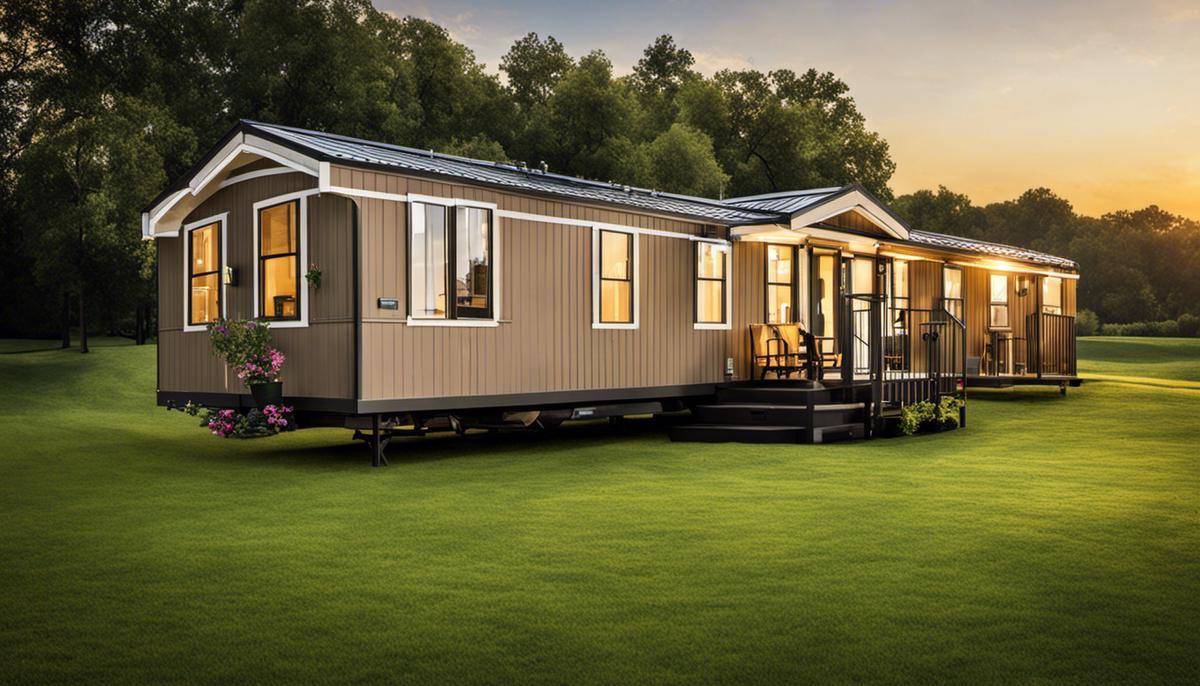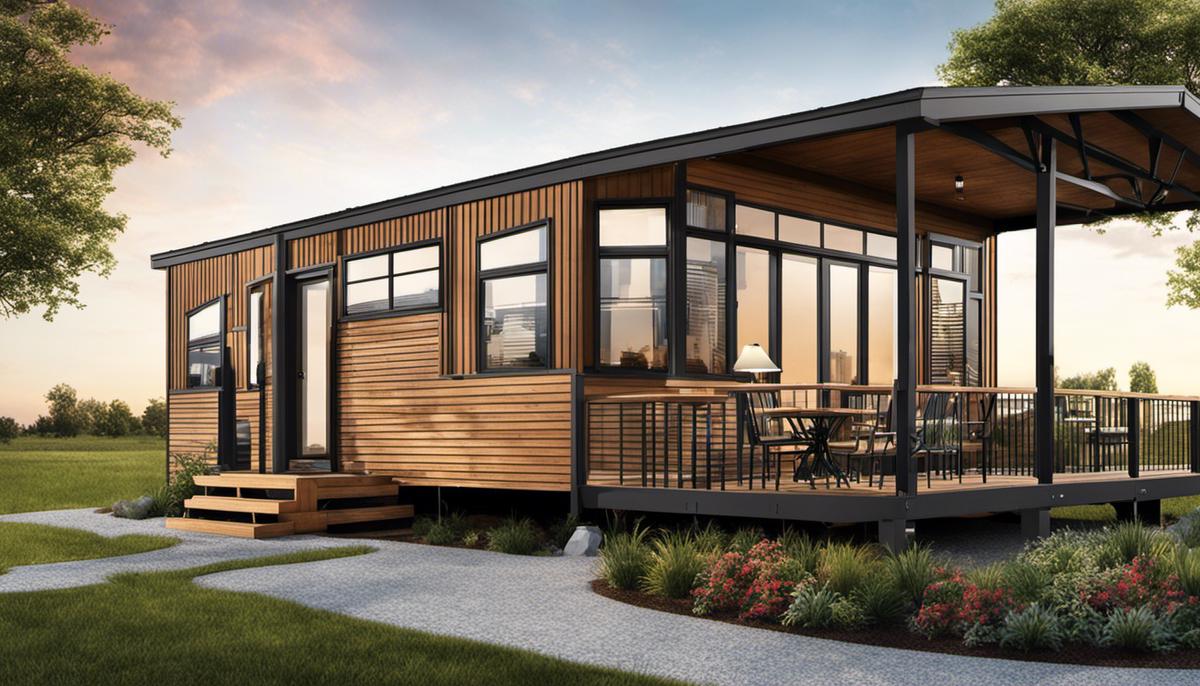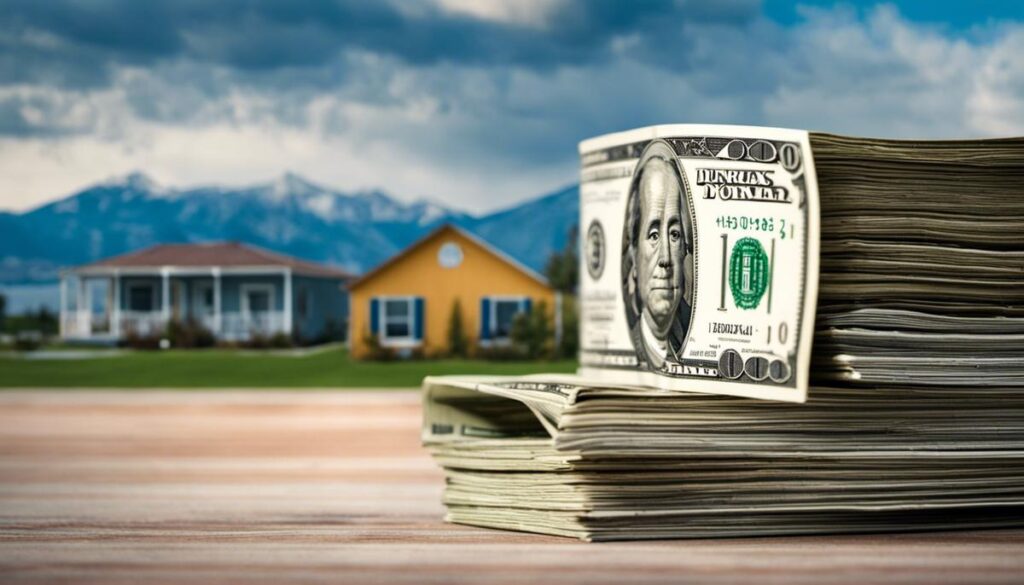In the pursuit of affordable housing and financial flexibility, many individuals have come to consider mobile homes as a viable option. However, like any major purchase, the upfront cost does not paint the full picture of the economic reality.
From the outset, prospective buyers must take into account not just the purchase price, but also hidden costs such as financing options, insurance, and interest rates. The journey of mobile home ownership doesn’t stop at purchase — it encompasses maintenance, land rent, utilities, and potential depreciation as well.
From understanding the long-term implications of homeowners association fees to realizing the evolving costs that occur under local tax regulations, the path toward mobile home ownership is nuanced and layered, filled with a series of additional expenses that materially influence the overall financial decision.
Table of Contents
ToggleHidden Costs of Buying a Mobile Home
Purchase Price vs. Total Cost
The cost of a mobile home isn’t just about the initial purchase price. It involves a series of other financial obligations, significantly raising the overall cost of ownership. You need to factor in various additional costs such as insurance and financing options, along with the impact of interest rates.
Mobile Home Insurance
While insurance is a necessary cost for all homeowners, insurance for mobile homes can be more expensive. This is due to the inherent risks associated with mobile homes, such as weather-related damage and the overall construction and materials used. Mobile homeowners should anticipate this additional monthly expense, and factor it into the total cost of the home purchase.
Financing and Interest Rates
Financing is another major factor that influences the actual cost of a mobile home. The most typical way to finance a mobile home is through a personal property loan also known as a ‘chattel loan’. This type of loan typically comes with a higher interest rate than a traditional mortgage loan, which can make a big difference in the monthly payment and the total amount paid over the life of the loan.
Property Taxes
Just like any other property owner, you will have to pay yearly property taxes on a mobile home. The exact amount will depend on the value of your home and the state you live in but be prepared for this ongoing expense. New owners often forget to factor in property tax in their budgeting.
Moving and Transportation Costs
Mobile homes come with the flexibility of relocation. However, if you choose to move your mobile home to a new location, that flexibility comes at a cost. Depending on the distance, moving a mobile home could cost thousands of dollars.
Maintenance and Repairs
All homes need upkeep and maintenance, and mobile homes are no exception. Mobile homes often require certain types of regular maintenance that can be costlier than a traditional home, such as roof re-coating. Mobile homes also have unique components like removable skirting and special-sized doors and windows, which can be more expensive to repair or replace.
Lot Rent
If you don’t own the land where your mobile home is situated, you’ll need to pay a lot of rent. This is a monthly fee paid to the park owner for the space your mobile home occupies. It’s important to note that lot rent does not usually include utilities such as water, sewer, trash, and sometimes even gas and electricity.
Purchasing a mobile home may initially seem like an affordable option due to its seemingly lower price compared to a traditional house. However, the hidden costs associated with it often make the total ownership cost much higher than one might initially estimate. Being aware of these hidden expenses is imperative to correctly calculate whether owning a mobile home is within your budget.

Maintenance and Repair Costs
The Costs of Maintaining and Repairing a Mobile Home
Similar to a conventional home, mobile homes are also subject to maintenance and repair expenses. From regular upkeep tasks such as air conditioning service to larger undertakings like roof replacement or exterior resealing, the costs can vary widely. Planning for these expenses is an important aspect of the mobile home ownership cost you may not realize at first.
The Cost of Routine Upkeep
Regardless of the model or make of your mobile home, regular maintenance is non-negotiable. This usually includes tasks such as cleaning or replacing air filters, testing and replacing smoke detector batteries, and general cleaning. While these costs may seem small individually, over time they can certainly add up. There are also certain costs unique to mobile homes, such as skirt repair or septic tank maintenance if your home is not connected to a public sewer system.
Larger Repairs Can Add Up
Over time, more significant repairs may be necessary, especially as the mobile home ages. This can include replacing appliances, repairing or replacing heating and air conditioning units, and eventually replacing the roof or flooring. Mobile homes are also vulnerable to structural deterioration, and over time frames, doors, windows, and walls can warp, particularly in regions subject to extreme weather conditions.
Improvements and Upgrades
Just like a traditional home, a mobile home will require upgrades over time. These may include improving insulation, installing energy-efficient windows, or upgrading to a higher-capacity air conditioning unit. These improvements can be expensive, particularly if you’re upgrading to higher-end products or materials.
Hidden Infrastructure Costs
Another potential hidden cost of buying a mobile home is infrastructure maintenance and repair. This typically includes the upkeep of driveways, sidewalks, stairs or ramps leading to the home, and any fencing. Additionally, if the mobile home is located in a park, there may be park fees and expenses to consider. These could include costs for water, sewage, trash pick-up, grounds maintenance, and even the use of communal amenities.
Although the sticker price of a mobile home may appear much less daunting than that of a traditional stick-built house, it is essential to consider the potential hidden costs that lie beneath. With the understanding that maintenance and repairs will be recurring expenses, mobile homeowners can plan their budgets more effectively. Proactively addressing these potential issues can make the cost of owning a mobile home truly affordable over the long term.

Land Rent and Utility Bills
Running Costs: Land Rent Can Heavily Impact Mobile Home Ownership
When buying a mobile home, it’s important to note that the purchase doesn’t always include the plot of land it stands on. Quite often, mobile homeowners own their dwelling but pay a monthly lease for the land owned by a third party.
This overlooked cost can significantly impact your monthly outgoings. The land rent can fluctuate greatly based on factors like location, included amenities, and the terms set in your lease agreement. Also, it’s not uncommon for annual rent increases to be part of the lease details, implying that the rent may increase over time.
Impact of Land Rent on Affordability
When considering the affordability of a mobile home, potential buyers should factor in the cost of land rent. The monthly cost of land rent, combined with your monthly mortgage or loan payment for the mobile home, could result in a total monthly payment equivalent to that of a traditional site-built home.
Utility Bills: Another Hidden Cost
Alongside land rent, utility bills are a recurring monthly cost linked with mobile home ownership. Since mobile homes are not typically as energy-efficient as traditional homes, utility bills could be higher than anticipated. Heating and cooling a mobile home can become a significant expense, especially in regions with harsh winters or extremely hot summers.
Understanding Local Utility Rates
It’s essential to understand local utility rates and consumption patterns before buying a mobile home. Higher utility bills can become a considerable financial burden on mobile homeowners, reducing the affordability of the home. Contacting local service providers for estimates on utility costs would be beneficial in understanding the possible monthly bills.
Home Maintenance: An Often Overlooked Aspect
Maintenance costs for mobile homes are another hidden cost, often not considered in the initial assessment. These homes require routine maintenance such as skirting repairs, roof coatings, and window replacements. The associated costs can accumulate over time, further adding to the monthly expenditures of owning a mobile home.
Conclusion
The affordability of mobile homes can sometimes be deceiving in the first instance. Nevertheless, hidden costs such as rent for the land, utility bills, and expenses for maintenance must be taken into consideration. These factors contribute to the overall total of owning a mobile home; hence, a potential buyer must conduct thorough research. Asking relevant questions could also help to unearth these additional costs, thereby ensuring a decision that is well thought out and informed.

Depreciation and Resale Value
Discussing Depreciation and Resale Value
A crucial consideration when purchasing a mobile home is the depreciation and resale value. Unlike regular homes which are built on-site (stick-built homes), mobile homes typically depreciate over time leading to a reduction in their market value. This normally results from use and wear, the absence of proper maintenance, out-of-date design features, or a combination of all these.
This decline usually kicks in once a new mobile home vacates the dealership. The initial sharp decrease in the home’s value is similar to the depreciation witnessed the moment a brand-new car is driven off the dealership lot. Consequently, the depreciation of a mobile home may take place at a slow yet unbroken speed throughout its lifespan.
Factor in Future Resale Value
The declining market value of mobile homes can have significant implications when it comes to reselling. Unlike stick-built homes, which can often be sold at a profit following renovations or property market growth, it’s difficult for mobile homeowners to recoup their initial investment let alone make a profit. The resale value of a mobile home is usually lower than the purchase price, even if the home is well-maintained.
This factor is often overlooked by potential buyers as they are lured in by the relatively low upfront purchase cost of mobile homes compared to traditional homes. However, it’s essential to consider that the low upfront costs might be offset by the high depreciation rates and reduced resale value.
Potential Hidden Costs
There are also hidden costs associated with depreciation. For example, it can impact financing options. Lenders often are reluctant to finance older mobile homes due to their depreciated value. This means if you look to sell your mobile home, potential buyers might struggle with securing a loan, which can directly impact you by decreasing the pool of potential buyers.
Maintenance costs also add to the overall expense. While a mobile home can offer initial cost savings, ongoing repairs, and upgrade requirements can make these homes more expensive over time, especially as the property ages and depreciates.
Purchaser Awareness
As a potential mobile home purchaser, it’s vital to be aware of the factors related to depreciation and resale value. Strategically planning for the future can aid you in managing your expectations and crafting your financial plans. If you’re considering using the mobile home as a long-term residence, depreciation may not pose a major concern. Nevertheless, If the prospect of selling the home at some point in the future exists, having an awareness of issues connected to depreciation and resale value is crucial.
Though a mobile home can provide an economical housing solution, especially for individuals buying a home for the first time or for those in retirement, one should not underestimate the concealed costs associated with depreciation and lower resale value. It’s of utmost importance to consider all factors associated with owning a mobile home while making an informed decision to purchase.

Homeowners Association and Local Tax
Homeowners Association Dues
One significant and often overlooked cost that can considerably affect your budget when buying a mobile home is the Homeowners Association (HOA) fees. Mobile home communities are often integrated with an HOA, which ensures maintenance and improvement of shared spaces such as landscaping, walking paths, and community centers, among other conveniences.
The amount you pay for these fees can vary substantially, influenced by factors such as the specific community, the range of amenities provided, and the geographical location. Thus, gaining a solid understanding of what these fees encompass and how frequently they may increase is important before you make a commitment to invest in a mobile home.
Property Taxes
Property taxes are another hidden cost when purchasing a mobile home. Unlike traditional homes where the property tax is based on the value of the land and house, mobile home taxes are typically levied as personal property tax, similar to a car. The tax rate may vary by city, county, or state. Be sure to investigate these tax details in advance, as it adds up to the total cost of owning a mobile home, taking up a significant portion of the annual budget.
Local Ordinances and Regulations
Understanding local ordinances and regulations is crucial when buying a mobile home. These ordinances can impact where you can park your mobile home and for how long. Some cities or counties might have zoning laws prohibiting mobile homes or limiting them to particular parks or areas. Some locations might require permits for mobile homes or impose rules about the mobile home’s age, size, or appearance. These regulations could have financial implications, including penalties for non-compliance, relocation costs, or additional taxes and fees.
Insurance Costs
In addition to mortgage payments, an often overlooked cost is the insurance for a mobile home. Depending on the area where you reside, you might need to consider coverage for specific local hazards like floods, windstorms, or earthquakes. Mobile homes are considered riskier to insure than other homes, leading to potentially higher premiums.
Utilities and Maintenance
The ongoing costs of utilities and maintenance are also significant hidden costs. While some utilities may be included in the park rent or HOA fees, others are not. Everything from routine maintenance to repairs or replacement of appliances, plumbing, or the HVAC system should be considered. Older mobile homes, in particular, may have higher maintenance costs as they may require more frequent repairs or upgrades.
Moving Costs
If you ever decide to relocate your mobile home, moving costs can be hefty. The expenses include hiring a professional mover, purchasing required permits, prepping the home for transport, setting up at the new location, and additional costs for an inspection to make sure the relocation was done correctly.
In conclusion
Becoming informed about these hidden costs will help you establish a realistic budget and possibly negotiate a better purchase price. It also protects you from financial pitfalls and surprises that could upset your financial plans in the future.

Exploring the hidden costs of buying a mobile home requires a comprehensive understanding of many contributing factors. From examining the variances between the purchase price and total cost to understanding the financial impact of maintenance, land rent, and utility bills, potential mobile homeowners need to have a holistic approach when making their decisions.
More so, being knowledgeable about depreciation and the possible resale value, and familiarizing oneself with the implications of homeowners association fees and local tax laws, can significantly influence one’s calculation of affordability and overall investment decision.
Ultimately, awareness and understanding of these hidden costs can help buyers effectively navigate through the intricacies of mobile home ownership, ensuring that they generate the best possible value out of their investment.











